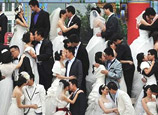
"Why is the hukou system so hard to reform? The real reason is the social benefits behind it. You need money to pay for the benefits," said Qiao Runling, deputy director of the China Center for Urban Development under the National Development and Reform Commission.
"The central government should pay, which it is already doing in the healthcare and compulsory-eduction sectors. The recipient cities' governments should pay. Employers and migrants also have to pay some."
Cai Fang, director of the Institute of Population and Labor Economics at the Chinese Academy of Social Sciences, said the central government should set a target and timetable for urbanization.
An urbanization rate based on the number of residents with hukou should replace the previous calculation, which is based on the regular residence population. This will create an imperative for local governments to raise the number of urban hukou holders.
Then the central government should set up a clear outline to let migrants know how they can apply for hukou, Cai said.
Though such a roadmap is available in some cities, such as Shanghai, experts said the threshold is too high for ordinary migrants.
"In Suzhou, for example, people who apply for a hukou need to have a proprietary home of no less than 75 square meters, and have a long-term labor contract with an employer. Most migrant workers there could not meet these requirements," said Qiao, the researcher from the National Development and Reform Commission.
In the reform of the hukou system, most experts, however, propose an "incremental" strategy instead of a radical one.
Zeng Kanghua, a public finance professor with the Central University of Finance and Economics, said the reform should start with the smaller cities.
"I've participated in the consultation of the reform of Beijing's kindergartens. The municipality intended to offer free kindergarten education to all Beijing residents regardless of whether they have a Beijing hukou or not. But they worried that if the deregulation is made, people across the country will flock to Beijing," Zeng said.
The outdated system to distribute fiscal resources is another hurdle to promote the reform.
"The current fiscal revenue expenditure system is mainly based on the number of hukou holders, rather than the number of regular residents," Zeng said.
"It would put huge pressure on local governments if the fiscal system does not change."

















 Beijing Film Academy releases list of re-examination
Beijing Film Academy releases list of re-examination


![]()
